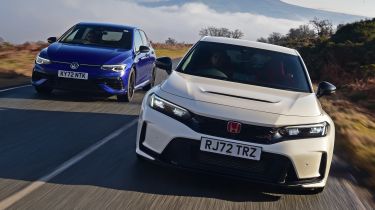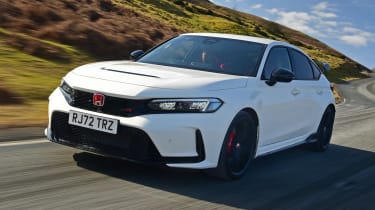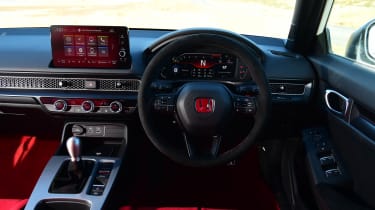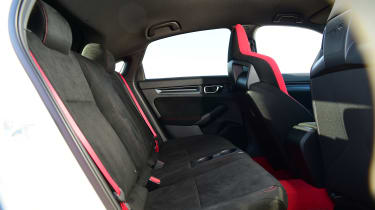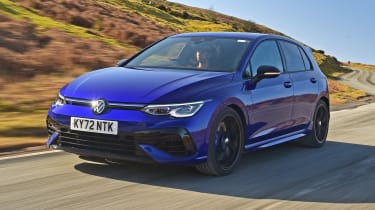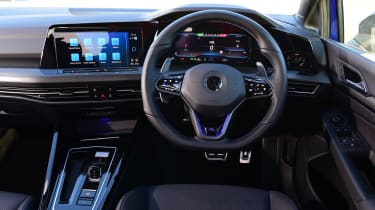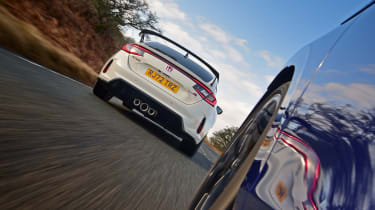Honda Civic Type R vs Volkswagen Golf R 20 Years: 2023 twin test review
New Honda Civic Type R locks horns with most powerful VW Golf R ever for bragging rights
When the first hot hatchbacks emerged, the three letters to catch the eye were GTI. Over the years, the hot hatch evolved, and so did the naming hierarchy. Now, if you want the ultimate performance, you want R – and the two cars here are each part of a long lineage that built the tradition.
First up is the new Honda Civic Type R. The fifth generation to make it to the UK gets more power and know-how than any model before it. Here, it’s pitched against the Volkswagen Golf R, in 20 Years form to mark the anniversary of the R brand. The latter has a couple of subtle changes, focused on the powertrain, that make it the most potent Golf R yet. But which R stands for ‘Ruler’, and which is ‘Runner Up’?
|
Honda Civic Type R |
Volkswagen Golf R 20 Years | |
|
Price: |
£46,995 |
£48,250 |
|
Engine: |
2.0-litre 4cyl turbo petrol, 324bhp, six-speed manual |
2.0-litre 4cyl turbo petrol, 328bhp, seven-speed auto |
|
0-62mph: |
5.4 seconds |
5.4 seconds |
|
Test economy: |
29.2mpg/6.4mpl |
31.0mpg/6.8mpl |
|
CO2: |
186g/km |
175g/km |
|
Annual VED: |
£520 |
£520 |
Honda Civic Type R
The Honda Civic Type R benefits from years of hot-hatch development – but all of that sophistication comes at a price. The new model starts at £46,995 – a massive step over the £31,500 the previous model cost barely five years ago. The signature Championship White paint finish adds £650, bringing the total for our car to £47,645.
Tech highlights
Under the bonnet, the latest Type R gets an evolution of the 2.0-litre turbo used in the previous generation. Gas flow plays a big part in the improvements; the turbocharger gets optimised turbine blades, while the exhaust system and new intake increase flow rate by 13 per cent and 10 per cent respectively.
Used - available now

2020 Ford
Focus
46,802 milesManualPetrol1.5L
Cash £14,296
2022 Ford
Focus
18,350 milesManualPetrol1.0L
Cash £17,076
2022 Kia
e-Niro
25,164 milesAutomaticElectric
Cash £15,799
2021 Peugeot
108
23,000 milesManualPetrol1.0L
Cash £8,449Factor in an upgraded radiator to improve cooling and a revised ECU to bring the upgrades all together, and the result is an engine which now pumps out 324bhp – an increase of 14bhp – and 420Nm, itself a 20Nm rise.
A lightened flywheel improves throttle response, while the springing for the six-speed manual gearbox has been adjusted to improve the shift feel, according to Honda – a tough ask since the previous shift quality was already brilliant.
All that drivetrain work necessitates some chassis tweaks, and the new Civic is a great place to start; it’s 15 per cent stiffer than the last model. On top of that, revised dual-axis front suspension with stiffer control arms, a wider rear track and tweaked geometry all round are just some of the many improvements. The aluminium bonnet is 43 per cent lighter than the FK8’s steel item.
Safety: The Honda Civic scored a five-star Euro NCAP rating when the latest version was tested in 2022. It scored between 80 and 90 per cent across all four categories.
On the road
Honda has form when it comes to brilliant front-wheel-drive cars, but this latest Type R is one of its most exciting – and certainly the most sophisticated – the firm has ever produced. around town: One trait shared by many of the best driver’s cars is that they feel special to drive, even at low speeds.
Thanks to the perfect weighting of the pedals and steering, plus the wonderfully slick and precise manual gearbox, the Type R absolutely falls into that category.
A & B-roads: Things get better the harder you work it. The chassis feels less like a fast five-door, and more like a bespoke sports car that just happens to have a hatchback body.
Even across challenging, twisty roads, the body control is just staggering. Load the car up through a turn, and bumps are shrugged off as though they barely exist, with each wheel working hard to absorb what the road throws at it.
The balance can be played with, though. Plant your right foot clumsily on a corner exit and the front wheels will scrabble for traction through second gear. Depending on how you choose to alter the throttle and steering both on entry to and through a corner, you can adjust the balance very precisely. The way the Civic behaves on the limit is entirely down to your own skill and feel.
The brilliant steering plays its part; not only is the weighting great, but there’s also plenty of feel, so you can suss out the precise moment that the front tyres breach the limits of grip.
Motorway: High-speed stability is excellent, which makes the Type R reassuring on a motorway – even if the rear tyres in particular generate quite a lot of road noise.
Ownership
Inside or out, the latest-generation Civic as a whole looks much more contemporary and mature than its predecessor, and the Type R additions really help to make the car feel exciting before you’ve even started the engine.
Lightweight sports seats offer fantastic support, and are mounted lower than in the previous version for a more sporty driving position. They’re finished in the signature Type R red – contrasting with the black rear seats – and the carpet and seat belts are also red. The steering wheel is finished in an Alcantara-like material, and there’s an aluminium shift knob for the six-speed gearbox.
Build quality is excellent, and the ergonomics are simple and logical; three dials cover most of the climate controls, while physical buttons are retained for the drive-mode settings, plus the various audio and cruise control functions on the steering wheel. Cabin storage is fine, with a couple of deep cup-holders and a wide smartphone shelf.
Honda offers a strong warranty with the Civic, which runs for three years and up to 90,000 miles. A three-year breakdown package is competitive, too.
Styling: Brilliant though the outgoing Civic Type R was, there were some hot hatch fans who were put off by the car’s rather divisive looks. Wild angles, dramatic spoilers and a scattering of fake intakes and vents meant that the overall appearance was a bit too obnoxious for some people. It seems that Honda has taken that on board with the latest version, which has a much cleaner look.
It’s no less purposeful, though. The wide front air dam and bonnet vent give a menacing appearance, while the long body hunkers down brilliantly on the 19-inch alloy wheels, making the Type R look every inch the racer for the road. The only wild concessions carried over from the last car come at the back, where the huge rear wing and triple exhaust outlets remain.
Practicality
The standard Civic is one of the most spacious family hatchbacks around, and with one or two small caveats, the same applies to the hot-hatch version.
Rear Space: The biggest of those caveats is that the Type R is only a four-seater. There’s no centre seat in the back; instead, there is a pair of cup-holders. However, those outer seats are great. Kneeroom is vast and headroom is fine. The lack of a middle seat means that there’s also loads of elbow space for passengers in the back.
Boot: At 410 litres, boot space is plentiful, too. While the volume is greater than the Golf’s, the load bay is a little misshapen, with pronounced curves around the inner wheelarches, and a step in the boot floor as it gets towards its deepest point. At 668mm, the boot lip is slightly lower than the Golf’s. The rear seat backs fold down for a 1,212-litre capacity.
What to buy?
Which engine and trim we’d choose
- Engines: There’s only one engine, and despite the increased power over the last Civic, Honda says its emissions are lower.
- Trim: Type R is the one trim level you can have, but standard equipment, both in terms of performance kit and in-car technology, is already very generous, so there’s little else we could ask for.
- Options: The options range is almost completely bare for the Civic. On the very limited list is a boot divider, which might come in handy for keeping your shopping in place during an impromptu B-road detour on the way home.
- Our choice: Championship White is the traditional Type R colour, and it’s what we’d add.
Volkswagen Golf R 20 Years
With a starting price of £48,250, the Golf is already at a £1,255 price disadvantage against the Civic. It’s easy to bump up the Volkswagen’s price much further, too, and a host of extras lift the total of the car that you see here to £51,077.
Tech highlights
The heart of the 20 Years is VW’s 2.0-litre turbocharged EA888 four-cylinder engine. With 328bhp, it’s 13bhp ahead of the standard R. Peak torque is the same 420Nm as in the Civic, but it arrives at 2,100rpm, 500rpm sooner than in the Honda. Tailing off at 5,500rpm, the peak torque lasts for 1,500rpm longer, too.
But while those stats catch the eye, it’s the changes to the turbo calibration and throttle valve opening, which VW says maintain boost pressure for a more immediate throttle response and will likely make a bigger difference on the road. Unlike the Civic, the Golf R comes exclusively with an automatic gearbox. Revised software gives a more pronounced thump on full-bore upshifts, but they’re no faster than the regular Golf R’s.
The chassis set-up remains unchanged, too. Drive is sent to all four wheels, with R-Performance Torque Vectoring able to split power between the front and rear axles, and individual rear wheels. Up to 100 per cent of the rear torque can be sent to the outside wheel to push the car out of a turn more effectively. Performance changes are rounded off by a two-tier spoiler similar to the item fitted to the Golf GTI Clubsport, which boosts rear downforce.
Safety: The Golf range as a whole was reassessed by Euro NCAP in 2022 and scored five stars. We found the lane-keep assist system far too intrusive, though, tugging on the wheel constantly on narrow roads – very unnerving. We soon switched it off.
On road
The Golf R is very rapid and refined on any road, but it isn’t as ultimately rewarding as the Type R.
Around town: At low speeds, the R is as easy to drive as any other Golf. The automatic gearbox and light steering make it relaxing in traffic, and with the adaptive dampers set to their softest, it’s as smooth as the more sensible models in the range.
A & B-roads: What’s absolutely beyond doubt is just how effective the Golf R’s point-to-point pace can be in almost any weather conditions. On the slippery Welsh roads of our test route, the R’s four-wheel-drive traction comes into its own; on sections where the Civic could light up its tyres in second and even third gear, the VW launches forward with complete confidence and eye-widening speed.
Power hard out of a tight corner, and there’s a subtle rear bias to the powertrain, which can even require a small steering correction to stop the back axle from getting out of line. The VW is a car that, regardless of your skill level, allows you to go very fast straight away.
Whether its ability to flatter an average driver is a good thing or not is down to your point of view, but while most motorists will be quicker in the Golf, the best drivers will be able to get more out of the Honda.
That inability to engage the keenest driver is a trait betrayed by a chassis that doesn’t have much in the way of adjustment. The steering is short on the feedback of its rival and has a dead zone around the straight ahead, while the Golf R’s extra mass means that there’s less agility in direction changes.
Motorway: Dynamic Chassis Control helps the Volkswagen’s high-speed comfort, and there’s a smooth ride at higher speeds. There’s less road noise with the Golf R than in the Civic, too.
Ownership
As with the exterior, Volkswagen has kept the 20 Years’s cabin changes fairly subtle.
Genuine carbon fibre is unique to this car – the lightweight material is used on the dashboard trims and the door inserts, giving the interior a motorsport-inspired look. It does mean that the seats, and particularly the fake-carbon-effect panels fashioned from leather on the bolsters, grate somewhat alongside the real carbon.
The steering wheel is pleasant to hold, but the touch-sensitive keys on the wheel are easy to catch by accident when you’re driving enthusiastically. Among these keys is an ‘R’ button; this allows the driver to select one of the various driving modes without taking their hands off the steering wheel.
There’s lots of adjustment for the wheel and the seat, so it’s easy to find a comfortable driving position. The top of the dash has a higher line than the Type R’s, though, which means when the seat is set as low as possible in each, the Honda gives better visibility ahead. Cabin quality doesn’t quite reach Volkswagen’s previous highs, and the Honda’s interior feels better finished and sturdier.
Volkswagen offers a three-year warranty with the Golf R, although the 60,000-mile limit is 30,000 miles short of its rival’s, and there’s only one year of breakdown cover as standard.
Styling: The Golf R has always exuded a subtle menace without being outlandish. The deep bumpers front and rear, with four tailpipes poking out the back, are the clearest hints that this is no ordinary Golf. Beyond the downforce-boosting rear spoiler, the 20 Years sets itself apart with subtle colour changes.
Three exterior shades are offered; Pure White paint is combined with blue 19-inch alloy wheels and door mirrors, as is Deep Black Pearl. The wheels can be black if you prefer, and these are standard with the Lapiz Blue exterior paint. There is a subtle ‘20’ logo on the B-pillars, too.
Practicality
Save for a little less boot space, the R 20 Years is no less roomy than any other Golf five-door hatchback. The Civic is a bit more practical all-round, though.
Rear Space: The Golf is pretty much average by the standards of hatchbacks when it comes to cabin space, with room for two adults in the back, and a third occupant at a push.
Although the Golf has slightly more headroom than the Civic, its rival has far more kneeroom. The Honda also has a slight edge for elbow space, too. We think it’s a bit mean that Volkswagen charges £360 for rear side airbags in a near-£50k car.
Boot: Out back, the 20 Years’s driven rear axle compromises boot space a little, so instead of the usual 380 litres you get in a front-wheel-drive Golf, there’s 341 litres. It’s a decent enough size still, though, and the seat backs fold nice and flat.
What to buy?
Which engine and trim we’d choose
Engines: There’s only one engine to choose from in the Golf R 20 Years, but it will be exclusive. While the R makes up 10 per cent of Golf sales, roughly one tenth of those will be for the 20 Years.
- Trim: The 20 Years gets more power and tech over the standard R, but it also costs £6,000 more. We’re not convinced the small gains are worth such a big outlay.
- Options: Two features which give the R more versatility and character will need you to spend more. Adaptive dampers, known as DCC, are an £850 option, while the Akrapovic exhaust costs £3,500.
- Our choice: Options only
Results
Which car comes out on top?
Winner: Honda Civic Type R
All of the incremental improvements over its predecessor have raised the already-brilliant Civic Type R to another level again. Slightly faster, slightly sharper and slightly more playful than before, the fact that it looks a little less wild than the version it replaced might be the biggest deal-maker. That it’s also impressively spacious inside a very fine cabin is merely a bonus.
It’s expensive, but you’ll still be hard pressed to find anything that can match this level of excitement at twice the price.
|
Pros |
Cons |
|
Frantic engine |
Road noise |
|
Brilliant chassis |
Small range |
|
Superb manual gearbox |
So-so infotainment |
Runner up: Volkswagen Golf R 20 Years
It’s the runner up here, but the VW Golf R 20 Years still deserves popularity with hot-hatch fans. It’s devastatingly fast on a twisty road – even more so than the Civic in tricky conditions – yet it’s no more difficult to live with than an entry-level Golf.
Ultimately, a hot hatch should be about excitement, and here the Golf can’t match the Civic. Unless you really want the prestige of the ultimate model, we’d take the standard R – it’s barely any slower and six grand cheaper.
|
Pros |
Cons |
|
Searing point-to-point pace |
Not that rewarding to drive |
|
Refinement |
Much more expensive than the standard Golf R |
|
Exclusivity of 20 Years edition |
Questionable ergonomics |
Rivals and other options
- Same class: Mercedes-AMG A 45 S
- Same money: Alpine A110
- Used: Audi RS 3 Sportback
- Used: Renault Megane Trophy R
- Coming soon: Hyundai Ioniq 5 N
The great debate
What the Auto Express test team would do…
Sean Carson, associate editor: “I can’t argue with VW when it says the 20 Years is the fastest Golf ever, but I reckon the best is further down the Golf range. The GTI Clubsport sacrifices a little power and two driven wheels in favour of a sharper, more enjoyable chassis that retains all the Golf’s plus points.”
John McIlroy, deputy editor: “The curtain was drawn on the last Civic Type R with the Edition: a spectacular finale that shed weight and became even more focused thanks to stickier tyres. This new model is so good already that it’s hard to imagine where Honda takes it from here, but I’m excited to see the firm try.”
Dawn Grant, picture editor: “With the latest Type R’s price hike, there aren’t many affordable hot hatches left. It means that the Hyundai i30 N is becoming almost the de facto choice at the £35-grand mark. I’m not complaining though – I think the i30 N looks great, and it’s brilliant fun to drive.”
Steve Fowler, editor-in-chief: “If you think that the Type R is a bit too expensive nowadays, then why not go for a second-hand version of its predecessor? Used examples of the FK8 start from £25,000, and it’s nearly as thrilling to drive as the new car. Just make sure you’re okay with the outlandish looks first.”
Yousuf Ashraf, video content producer: “The Golf isn’t short on pace, but the aftermarket can take it to greater extremes. German tuner ABT Sportsline offers a package for the standard R, which lifts power to 379bhp and 470Nm. At £1,810 (plus VAT) you could get a standard R and still save a few grand over the 20 Years.”
What would you do? Let us know in the comments section below…
Specs and prices
| Honda Civic Type R | Volkswagen Golf R 20 Years | |
| Petrol or diesel? | Petrol | Petrol |
| MPG | 29.2 | 31 |
| Fuel price (£) | £1.48 | £1.48 |
| P11D value | £46,005 | £47,250 |
| Fill up | £69.70 | £81.56 |
| On the road price/total as tested | £46.995 / £47,645 | £48,250 / £51,077 |
| Residual value (after 3yrs/36,000) | £28,465 (60.6%) | £24,699 (51.2%) |
| Depreciation | £18,530 | £23,551 |
| Annual tax liability std/higher rate | £3,403.37 / £6,808.70 | £3,496.50 / £6,993 |
| Annual fuel cost (10k/20k miles) | £2,309 (£4,618) | £2,175 (£4,349) |
| Ins. group/quote/VED | 43 / £802 / £520 | 35 / £888 / £520 |
| Service costs (3 years) | £1,620 | £1,482 |
| Length/wheelbase | 4,594 / 2,734mm | 4,290 / 2,628mm |
| Height/width | 1,401 / 1,890mm | 1,451 / 1,789mm |
| Engine | 4cyl-in / 1,996cc | 4cyl-in / 1,984cc |
| Peak power/revs | 324bhp at 6,500bhp | 328bhp at 5,600-6,500rpm |
| Peak torque/revs | 420 Nm at 2,600-4,000/rpm | 420Nm at 2,100-5,500rpm |
| Transmission | 6-spd man / fwd | 7-spd auto / 4wd |
| Fuel tank capacity/spare wheel | 47 litres / repair kit | 55 litres / yes |
| Boot capacity (seats up/down) | 410/1,212 litres | 341/1,233 litres |
| Kerbweight | 1,429kg | 1,555kg |
| Turning circle | 12.1 metres | 12.0 metres |
| Basic warranty/recovery | 3 yrs (90,000)/3 yrs | 3 yrs (60,000)/1 yr |
| Driver Power manufacturer position | 5th | 18th |
| Euro NCAP: Adult/child/ped./assist/stars | 89/87/82/83/5 (2022) | 88/87/74/82/5 (2022) |
| 0-62mph/top speed | 5.4 secs / 171mph | 4.6 secs / 168mph |
| Auto Express economy/range | 29.2 / 302 | 31.0 / 375 |
| WLTP combined | 34.4mpg | 34.9mpg |
| WLTP combined | 7.6mpl | 7.7mpl |
| Actual/claimed CO2 | 233 / 186g/km | 211 / 175g/km |
| Airbags/Isofix/parking sensors/camera | Eleven/yes/yes/yes | Seven/yes/yes/£320 |
| Auto box/lane keep/blindspot/AEB | No/yes/yes/yes | Yes/yes/yes/yes |
| Climate ctrl/cruise/leather/heated seats | Yes/yes/no/no | Yes/yes/yes/yes |
| Met paint/LED lights/keyless entry & go/pwr tailgate | £650/yes/yes/no | £690/yes/yes/yes |
| Sat-nav/digital dash/DAB/connected services | Yes/yes/yes/yes | Yes/yes/yes/yes |
| Wireless charging/Apple CarPlay/Android Auto | Yes/yes/yes | Yes/wireless/wireless |
Now read our list of the best performance cars...

